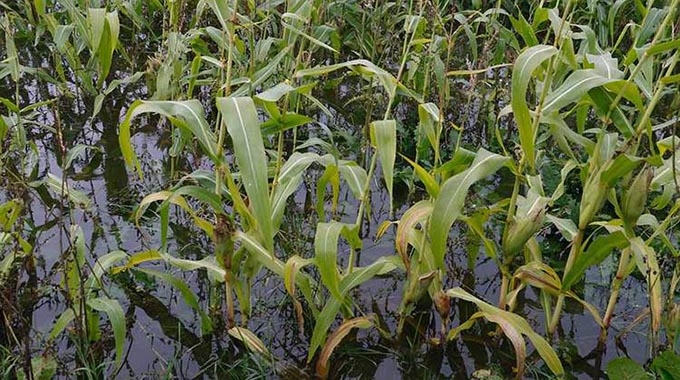
Sifelani Tsiko
Agric Editor
Farmers have been urged to work closely with agricultural extension workers in their areas to devise strategies for managing leaching due to the heavy rainfall that has pounded various parts of the country resulting in the loss of valuable fertiliser applications.
Zimbabwe Farmers Union (ZFU) director Paul Zakariya told The Herald recently that excessively wet conditions due incessant rains had negatively affected crop growth with farmers reporting leaching as a major problem.
“Incessant rains or abnormally high amounts of rain can leach nutrients, especially nitrogen, from the soil. Nitrogen added to the soil in the form of granular fertiliser is especially vulnerable to leaching,” he said.
“And if this occurs, farmers either have to incur the additional cost of reapplying fertiliser or experience the reduction in crop yield associated with nutrient deficiency.”
In light of the growing problem of leaching, Zakariya said it was vital for farmers to work closely with agricultural extension workers to minimise losses and boost yields.
“When faced with this problem, as the ZFU, we normal call on our farmers to pay particular attention to how and when they apply the amount of nitrogen fertiliser to meet crop requirement,” he said.
“Farmers should carefully work out the amount of nitrogen fertiliser needed for each crop in each field by splitting or spacing the application of fertiliser in their fields. Apart from this, farmers can re-apply fertiliser to their crops, but this tends to increase their production cost.”
Leaching of soils, he said, varied from one place to another and working closely with agricultural extension workers could help farmers deal with this problem depending on soil types and other agro-ecological conditions.
“What I have said is general advice and what is critical is for farmers to work closely with extension workers to come up with appropriate means of addressing leaching,” Zakariya said.
“With the likelihood of continued heavy rain, fertiliser rates are best split into frequent applications of small amounts.”
Dr Maria Goss, an agriculture systems and innovation leader at Practical Action, proffered various recommendations to help farmers minimise the impact of leaching on crop yields.
She said application of organic matter on Pfumvudza plots as well as adding manure, compost and other organic soil amendments onto plants could help slow the release of plant nutrients thus reducing overall impact on crop health and growth.
This, she also said, could reduce further loss of top soil layer via erosion helping to restore plant nutrients.
Dr Goss also said promoting crop diversity within a particular cropping area through inter-cropping could help improve soil cover, reducing excessive runoff plus soil erosion.
“Crop diversity can help to prolong plant nutrient retention within crop root zones,” she said.
“Legumes such as beans, cowpeas, bambara nuts, groundnuts, pumpkins, horned cucumbers (magaka), gourds (mapudzi) and others, if inter — planted within a cereal crop could further cushion against total crop failure due to excessive rains.
“This also provides more organic matter into the soil since these plants produce larger leaf area, thus more organic biomass per area which works towards increasing the organic matter content of the soil thus further addressing a more balanced and realistic nitrogen ratio within the soil.”
Furthermore, the agricultural expert said, the different rooting zones of these diverse crops (shallow versus deeper root systems) could enable other crops within this inter-crop system to still utilise these leached nutrients.
Another important measure, she said, was for farmers to construct infiltration pits that originally work to capture rain water in a prolonged dry rainy season or erratic rainy season to prolong moisture availability within a cropping area.
“In this particular context, these structures will now assist in drawing excessive water away and out of the cropping area thus reducing the amount of time this water stands in the field thus reducing leaching rate,” Dr Goss said.
“These will also significantly work towards redirecting this excessive rain water runoff into existing underground water aquifers.
Infiltration pits will further reduce continued land degradation as a result of excessive runoff and gulley formation within cropping areas and homesteads.”
In addition, Dr Goss said strategic soil nutrient supplementation through split application of either organic or inorganic fertilisers had to be done depending on the intensity of rainfall and soil type within a given farming area.
“Smaller and more frequent applications are highly advised to avoid a once off application being leached away,” she said.
“Farmers therefore need to work closely with local extension support teams to guide the number of split plant nutrient applications based on various local conditions — for example — sandy loams leach faster therefore more split applications are recommended.
“Then crop nutrient needs also need to be considered e.g. tomatoes are heavy feeders therefore they need an appropriate plant nutrient management schedule, thus smaller and regularly timed applications are advisable.”
Maintaining an appropriate level of soil fertility by the careful use of fertilisers, organic manures and lime will help to maximise the profitability of farming systems.
Agricultural experts estimate that 80 percent of arable land in Africa has low soil fertility and suffers from physical soil degradation as a result of massive nutrient loss caused by unsustainable soil management practices.
Nitrogen is responsible for crop growth and yields obtained in agricultural production.
It is also the most limiting nutrient to plant growth in smallholder farms in Africa due to its susceptibility losses resulting from leaching and runoff or erosion, among other factors.
